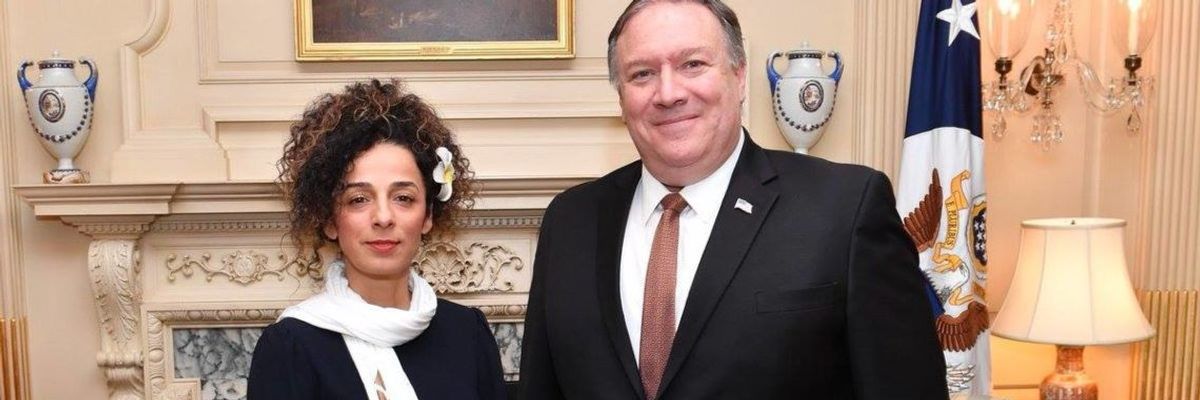The Trump administration is adamant that Iranians welcome the assassination of Qassem Soleimani. Secretary of State Mike Pompeo claimed Iraqiswere “dancing in the street … thankful that General Soleimani is no more” and that Iranianswill view the U.S. as “giving them freedom.”
The facts on the ground did little to match Pompeo’s assessments, however, with massive funeral processions for Soleimani in both Iraq and Iran, while Iraq’s parliament called for the expulsion of U.S. troops because of Soleimani’s assassination. But one frequently cited Iranian voice in the mainstream media, Masih Alinejad, has been repeatedly echoing the administration’s claims that Iranians, despite all visible evidence, were welcoming Trump’s potential act of war against Iran.
Fox News for example presented Alinejad – who appeared on the network onFriday,Saturday, andSunday – as an “Iranian journalist” or “Iranian journalist and activist,” missing a key detail about her biography: she’s paid by the U.S. government. CNN, and New York Times columnist Bret Stephens also quoted her without acknowledging her government funding.
Alinejad works as an “anchor, writer, reporter for [Voice of America] Persian Service,” a U.S. government owned television network broadcasting to Iranians, according to a publicly available description of her federal contract reviewed by Responsible Statecraft.
She received more than $305,000 in contracts for her work at Voice of America (VOA) Persia between May, 2015 and September 10, 2019, the date of her most recent contract.
That crucial context was missing in her television appearances and other media citations in which she appeared to closely echo the Trump administration’s line that the Soleimani assassination was welcomed in the region even when there is little evidence to support the assertion.
On Friday, Stephens took the contrarian view that Soleimani’s killing may bring calm to the region and cited Alinejad, without acknowledging her government funding, to back up his assertion. “One possible outcome is that a spooked Iranian leadership, already reeling from devastating sanctions and mass demonstrations, will prefer to tread lightly, at least for the time being,” wrote Stephens. “‘Suleimani’s death could bring a sense of realism to the Islamic Republic’s thinking,’ says the Iranian-American journalist Masih Alinejad.”
On Friday, Alinejad told Fox News that Western journalists in Iran are “not even in touch with ordinary [Iranian] people” and, largely due to purportedly wanting to maintain good relations with the Iranian government, don’t report on widespread dissatisfaction with the government and anger at Soleimani.
On Saturday, she told Fox News — again, contrary to available evidence — that “a lot of Iranians do not see Qassem Soleimani a hero” and claimed that Iranian victims of Iranian Revolutionary Guard Corps’ violence during the November protests in Iran are “very happy” with his death.
And on Fox News on Sunday, she continued to echo Trump administration claims that the large turnout for Soleimani’s funeral procession in Tehran was explained by “employees of the government” and students being “forced to go to the streets.” She added that “average Iranians see the Revolutionary Guard as a terrorist organization” but acknowledged that Trump threatening to destroy Iranian cultural sites was unhelpful.
Fox News wasn’t the only network to give Alinejad a platform. CNN’s Fareed Zakaria had Alinejad on his show, GPS, onDecember 22 to discuss the month-long protests and introduced her only as “an Iranian Activist in exile” without disclosing that she is paid by the U.S. government.
In her own capacity, Alinejad is less than transparent about her ties to the U.S. government. On Twitter, she has more than 152,000 followers but she describes herself on her profile only as an “Iranian journalist and activist,” making no mention of her role at VOA or her government contracts.
Under the Trump administration, VOA has become, as one of the network’s former senior managing editors put it, “a mouthpiece of Trump — only Trump and nothing but Trump.” Another former senior editor there called it “blatant propaganda” with “no objectivity or factuality.” Indeed, VOA Persian journalists have increasingly attacked Americans who are critical of Trump’s Iran policy. In August, The Intercept took a closer look andfound, “The public attacks are the most visible manifestation of a transformation that’s been underway since November 2016. VOA Persian and many of its staffers have become rabidly pro-Trump, abandoning their stated mission of providing balanced news to Iranians.”
U.S. government funded and operated Radio Farda also failed to disclose Alinejad's role as a government contractor.In February, Radio Farda published an article describing how, “U.S. Secretary of State Mike Pompeo met Iranian-American women’s rights activist and journalist Masih Alinejad on Monday February 4 and thanked her for her bravery.”
Alinejad tweeted about the meeting,saying, “I did my best to be the voice of people who trust me,”and “many Iranians want an end to the Islamic Republic.”
The Washington Post published an op-ed on Monday by Alinejad, and while it originally did not disclose her VOA affiliation, it later amended the article to reflect her employment there. Media outlets should be following the Post in disclosing that Alinejad is being paid by the U.S. government and works for the increasingly pro-Trump Voice of America.















